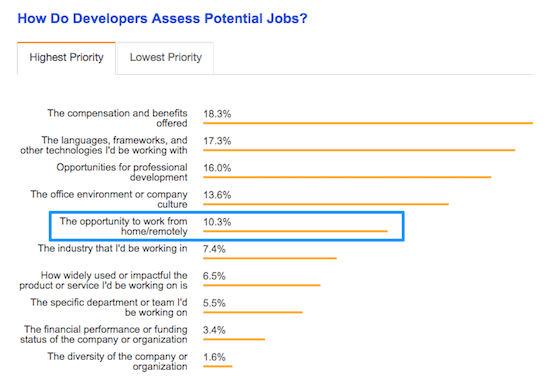Company environment and culture are incredibly important for developers. Over 13% of developers consider these elements as top priority in a role and according to the CodinGame 2018 Developers at Work Survey, developers with the greatest career satisfaction tend to work for smaller companies.
How can larger businesses stimulate the startup environment that developers love being a part of?
Move towards trending technologies

One of the highest priorities to developers in their job – 17% of developers list this as their highest priority – is what technologies they’ll be using day to day. You can’t base your whole company around this. However, being open-minded to new languages and frameworks when there’s scope to be will be appreciated by developers.
For example, JavaScript is the most used programming language by developers. However, Python, Rust, and C++ are always called out as the ones that they prefer. A developer will definitely prioritize new job opportunities and stick with a role where he gets to code in a language (at least some of the time) that he loves.
It’s all about company culture

Wouldn’t it be great for your day job to be the thing you loved doing anyway? Well, most developers just love coding. According to Stack Overflow, over 80% of developers say that coding is their hobby and more than 55% of developers contribute to open source projects in their spare time. As a company, you can be sensitive to this in the type of atmosphere and culture you create for your developers – both during and after office hours.
For example, for team building days or social events, consider doing something that will go hand in hand with a developers interest – like a hackathon. 76% of developers who attend hackathons do so, simply, because they enjoy them.
Transparency – that thrown about term – is also imperative to achieving an attractive company culture. Transparency is something that can get lost along the way in a larger company. Amazon Developer Advocate Chris Munns explains: “it’s simply about stopping developers from feeling marginalized or that they’re just ‘code monkeys’ in a feature farm”. How is this achieved? By making sure the development teams know how and why certain decisions have been made and giving them the chance to give feedback.
Keep agile management agile
The terms Agile and Agile Development have been implemented so energetically in companies, big to small, that sometimes their real purpose is being forgotten. Agile is all about being able to respond quickly to change – adapt yourself and your work to the meet the current context – and it was born in programming teams. Today, over 85% of developers use Agile to keep their projects on track, 58% usually using the Scrum framework. What’s key is to not lose sight of the principles of Agile, even when more structure gets built around it. After all, as Henrik Kniberg at Spotify says:
“Rules are a good start, but break them when needed.”
Spotify’s self-organized product “Squads” are made up of 8 people or less. These squads were a reaction to growing teams and an original Agile framework that wasn’t quite working anymore. The Squads’ key drive is autonomy, giving the members a sense of collective ownership. It’s easy to see why developers love working in this way:
So, the focus of companies using Agile in their development teams should be to keep it just that; an agile, fluid, responsive structure to work within. Flexibility is key; if it’s not working, have the business conviction to change it. As “Uncle” Bob Martin explains in The Future of Programming, the whole Agile movement might just have to change, again, with programmers – and their software craftsmanship – leading the way in their practices and the disciplines they use.
Allow time for innovation and personal growth
According to Stack Overflow, almost 90% of all developers say they have taught themselves a new language, framework, or tool outside of their formal education. Developers enjoy learning new skills. In our recent 2018 Developers at Work Survey 68% of developers stated that the ability to learn new things is more important than salary – so innovation and learning space for developers should be a focus.
Whether you implement a framework where your developers get a set number of hours each month to step back from project work and focus purely on learning a new skill or even have a budget for one-off talks and conference sessions, the impact on your developers’ career satisfaction and performance would be measurable.
Prioritize “psychological safety”

How a team interacts together has shown to be just as important, if not more, than who is on the team. Psychological safety is centered around the idea that an employee should be able to take risks on the team without feeling insecure or embarrassed. This gives your teams space to produce innovative, diverse ideas and be more effective, positively impacting the business overall.
When a company, or the development team within it, grows in size, this important element of team life can get lost or forgotten. Paiyak Development explains that mentoring is a critical aspect of web development. Not only does it make the ever-changing landscape of development manageable by sharing experiences, but it strengthens the development network by getting the team talking and sharing. A good mentoring system helps team members to learn from each other’s strengths and weaknesses. This, in turn, improves not only their personal skills, but the team’s work output as a whole.
Be flexible with working hours
The possibility of flexible working hours is often pushed aside when a company grows (working from home or remote working). In Stack Overflow’s Global Developer Hiring Landscape 2018 survey, over 10% of developers labeled the opportunity to work from home/remotely as their highest priority. It’s actually the preferred way to work (at least some of the time) for the majority of developers. Not surprising that the highest job satisfaction rate comes from full time remote developers, according to Mobilunity.
Developers tend to enjoy working late at night or early in the morning when it’s quiet and they can, uninterruptedly, get in the zone and focus 100% on coding. As a company, can you give your developers the flexibility they crave?
One final thought
With all company shifts and changes, least of all within larger businesses, nothing can change dramatically overnight. However, we hope our collection of points has illustrated that it’s the small considerations and adjustments that can have the biggest impact on your development team. Understanding how they work best, how they interact most comfortably and how they slot into company life are undoubtedly the first steps you can take to creating a startup environment that they’ll love you for.


